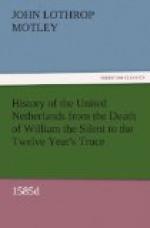When he first heard of the glorious victory at Lepanto, his countenance had remained impassive, and he had continued in the chapel at the devotional exercises which the messenger from Don John had interrupted. Only when the news of the Massacre of St. Bartholomew first reached him, had he displayed an amount of cheerfulness equal to that which he manifested at the fall of Antwerp. “Never,” said Granvelle, “had the King been so radiant with joy as when he held in his hand the despatches which announced the capitulation.” The letters were brought to him after he had retired to rest, but his delight was so great that he could not remain in his bed. Rushing from his chamber, so soon as he had read them, to that of his dearly-beloved daughter, Clara Isabella, he knocked loudly at the door, and screaming through the keyhole the three words, “Antwerp is ours,” returned precipitately again to his own apartment.
It was the general opinion in Spain, that the capture of this city had terminated the resistance of the Netherlands. Holland and Zeeland would, it was thought, accept with very little hesitation the terms which Parma had been offering, through the agency of Sainte Aldegonde; and, with the reduction of those two provinces, the Spanish dominion over the whole country would of course become absolute. Secretary Idiaquez observed, on drawing up instructions for Carlo Coloma, a Spanish financier then departing on special mission for the Provinces, that he would soon come back to Spain, for the Prince of Parma was just putting an end to the whole Belgic war.
Time was to show whether Holland and Zeeland were as malleable as Antwerp, and whether there would not be a battle or two more to fight before that Belgic war would come to its end. Meantime Antwerp was securely fettered, while the spirit of commerce—to which its unexampled prosperity had been due—now took its flight to the lands where civil and religious liberty had found a home.
=====================================
Note on Marnix de Sainte Aldegonde.
As every illustration of the career and character of this eminent personage excites constant interest in the Netherlands, I have here thrown together, in the form of an Appendix, many important and entirely unpublished details, drawn mainly from the Archives of Simancas, and from the State Paper Office and British Museum in London.
The ex-burgomaster seemed determined to counteract the policy of those Netherlanders who wished to offer the sovereignty of the Provinces to the English Queen. He had been earnestly in favour of annexation to France, for his sympathies and feelings were eminently French. He had never been a friend to England, and he was soon aware that a strong feeling of indignation—whether just or unjust—existed against him both in that country and in the Netherlands, on account of the surrender of Antwerp.




